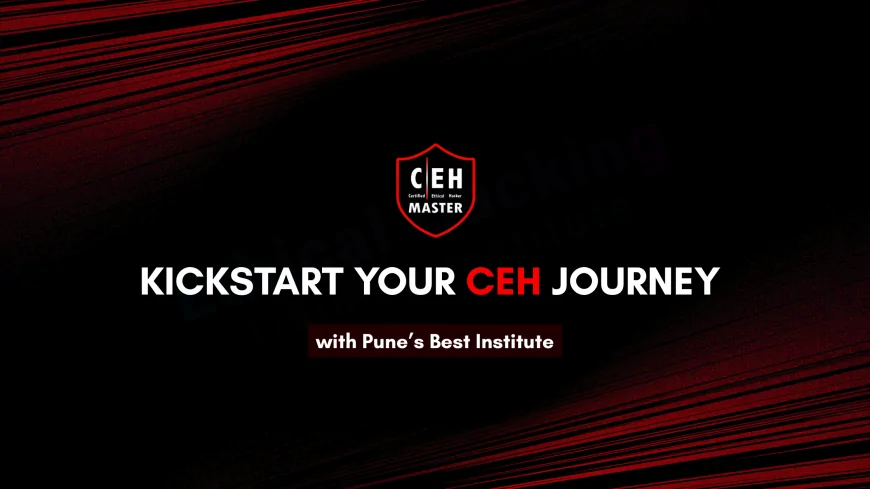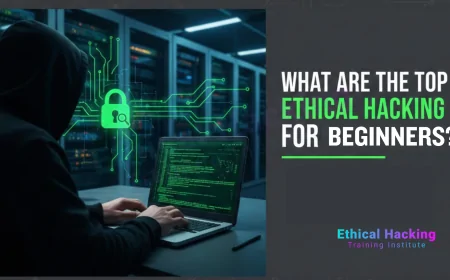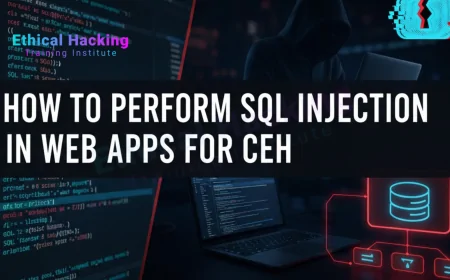Certified Ethical Hacker Institute in Pune | CEH Training with Placement
Join the top Certified Ethical Hacker Institute in Pune and master EC-Council's CEH curriculum with expert trainers, hands-on labs, and 100% placement assistance. Start your ethical hacking career today!

With the growing surge in cyber threats and online vulnerabilities, the demand for certified ethical hackers has skyrocketed. Pune, one of India's fastest-growing tech hubs, has positioned itself as a center for cutting-edge cybersecurity training. From government initiatives to private tech partnerships, Pune offers the ideal ecosystem for anyone looking to become a Certified Ethical Hacker (CEH).
If you're passionate about hacking ethically, protecting digital assets, and mastering red team/blue team strategies, then joining a Certified Ethical Hacker (CEH) institute in Pune can transform your career path dramatically.
Why Pune Is the Best City to Pursue CEH Training
Tech Ecosystem & Industry Demand
Pune is home to hundreds of IT companies, from startups to global MNCs. These organizations consistently seek cybersecurity experts to secure applications, systems, and infrastructure. Training in Pune means proximity to top recruiters.
Academic Infrastructure
With elite universities and tech-focused institutes, Pune supports a culture of academic excellence. Ethical hacking programs often collaborate with universities and offer recognized certifications.
Community Support & Local Events
Pune's cybersecurity community is incredibly active. Regular hackathons, conferences like Nullcon and BSides, and local OWASP chapters create real opportunities to network and grow.
What Sets a Leading CEH Institute Apart in Pune?
1. Certified Trainers with Real-World Experience
Instructors aren’t just certified; they bring years of hands-on penetration testing, incident response, and red team experience. This real-world insight adds unmatched value.
2. EC-Council Approved Curriculum
The CEH training follows official EC-Council guidelines, covering:
-
Footprinting & Reconnaissance
-
Scanning Networks
-
Enumeration
-
System Hacking
-
Malware Threats
-
Sniffing & Social Engineering
-
Web Application and Wireless Hacking
-
Cryptography
3. Practical Lab Exposure
Students gain 24/7 access to cloud-based labs with over 140 attack techniques. Tools like Metasploit, Nmap, Burp Suite, Wireshark, and John the Ripper are included.
4. Red & Blue Team Simulation Training
Simulated exercises allow learners to switch between attacker and defender roles. This dual approach deepens understanding of network defense and offense.
5. Interview Preparation & Career Guidance
Beyond certification, leading institutes offer resume building, mock interviews, HR workshops, and connections with cybersecurity recruiters.
Course Structure: What to Expect
Week 1-2: Foundations of Ethical Hacking
-
Cybersecurity principles
-
Basics of Linux and Windows security
-
Virtual machine setup and testing environments
Week 3-4: Network Scanning & Vulnerability Detection
-
TCP/IP protocols
-
Network sniffing tools
-
Identifying system vulnerabilities
Week 5-6: Exploitation Techniques
-
Password cracking
-
Privilege escalation
-
Reverse shells and backdoors
Week 7-8: Advanced Web App & Wireless Hacking
-
SQL Injection, XSS, CSRF
-
WPA2 cracking, Rogue AP, Evil Twin attacks
Week 9: Cryptography & Steganography
-
Hashing algorithms
-
Digital signatures
-
Hiding data in files and images
Week 10: Final Project + Certification Exam Prep
-
Conduct a full penetration test
-
Report writing and client communication
-
Practice EC-Council’s CEH exam with mock tests
Career Pathways After CEH Certification
Ethical Hacker
Work with companies to test systems and patch security gaps.
Penetration Tester
Simulate real-world attacks to find network vulnerabilities.
Security Analyst
Monitor and respond to security events across infrastructure.
SOC (Security Operations Center) Analyst
Handle real-time security incident detection and remediation.
Cybersecurity Consultant
Provide strategic advice to businesses on improving security posture.
Who Should Join a CEH Course in Pune?
Students and Graduates
Build your cybersecurity foundation and stand out in job interviews.
Working IT Professionals
Upgrade your skills to switch to a high-paying cybersecurity career.
Entrepreneurs and Startups
Protect your applications and customer data by understanding the hacker mindset.
Law Enforcement and Government Officers
Understand digital crimes, malware investigations, and cyber law applications.
Additional Certifications You Can Pursue After CEH
-
ECSA (EC-Council Certified Security Analyst)
-
CHFI (Computer Hacking Forensic Investigator)
-
CND (Certified Network Defender)
-
OSCP (Offensive Security Certified Professional)
Soft Skills That Complement Technical Learning
Communication Skills
Ability to explain technical issues to non-technical stakeholders.
Analytical Thinking
Breaking down complex vulnerabilities logically.
Ethical Responsibility
Understanding legal frameworks and acting within boundaries.
Placement Support & Success Stories
Internships & Live Projects
Top CEH institutes in Pune offer real client projects, including security audits for startups and NGOs.
Alumni Highlights
Many graduates land roles in top firms like Wipro, Infosys, and Capgemini or startups where they lead security initiatives.
Mock Interviews & Resume Workshops
Students receive one-on-one interview coaching and guidance on building cybersecurity-specific resumes.
Red Flags to Avoid in CEH Courses
-
No hands-on labs or tools
-
Outdated curriculum
-
No support for exam prep
-
No post-course placement assistance
-
No certification from EC-Council
Always ensure the institute offers practical exposure, industry-recognized certification, and placement help.
FAQ's
1. What makes the Ethical Hacking Institute in Pune the best for CEH training?
The institute combines EC-Council-certified trainers, hands-on lab access, and 100% placement support. Students train on real-world tools like Metasploit, Wireshark, and Burp Suite. Its expert-led classes, red/blue team simulations, and career guidance set it apart in Pune’s cybersecurity education scene.
2. Is CEH certification from Pune recognized globally?
Yes. Ethical Hacking institutes in Pune offer EC-Council-accredited CEH certification, which is internationally recognized and accepted by companies and government organizations worldwide. Completing your training in Pune gives you the global credibility needed to work in cybersecurity across industries.
3. What is the duration of the Certified Ethical Hacker (CEH) course in Pune?
Most institutes in Pune offer CEH courses spanning 10 to 12 weeks. The program includes theory, labs, red/blue team simulations, and final project work, along with preparation for the official CEH exam.
4. Do CEH institutes in Pune offer placement assistance?
Yes, top institutes offer strong placement support including resume building, mock interviews, and job referrals. Many graduates have been placed at companies like Infosys, Wipro, Capgemini, and cybersecurity startups through dedicated placement cells.
5. What are the prerequisites to join CEH training in Pune?
While prior experience isn’t mandatory, basic knowledge of networking, operating systems, and computer fundamentals is beneficial. Some institutes may offer pre-course modules for beginners to help them catch up before deep diving into CEH content.
6. Is hands-on lab training included in the CEH course in Pune?
Absolutely. The course offers 24/7 cloud-based lab access with over 140 attack scenarios. You'll use professional tools like Nmap, Metasploit, Aircrack-ng, and Hydra in simulated environments that mirror real-world ethical hacking tasks.
7. What tools will I learn in a CEH course in Pune?
Students train with leading cybersecurity tools such as Metasploit, Nmap, Wireshark, Burp Suite, John the Ripper, Nikto, and Aircrack-ng. These tools prepare you for real-world penetration testing and vulnerability assessments.
8. How much does the CEH course cost in Pune?
CEH course fees in Pune generally range between ₹35,000 to ₹65,000 depending on the institute, duration, and added services like placement training, certifications, and lab access. Some institutes offer EMI and scholarship options.
9. Can I learn ethical hacking in Pune without any IT background?
Yes. Some CEH institutes in Pune offer beginner-friendly courses with foundational modules in networking, operating systems, and Linux basics to bridge the knowledge gap. However, motivation and willingness to learn are crucial.
10. Will I get an EC-Council certificate after completing CEH in Pune?
Yes. Upon successfully completing the course and passing the EC-Council exam, you'll receive an official CEH certificate that is globally recognized and valid across industries.
11. Are there live projects or internships included in the CEH course?
Top institutes include internships and real-time projects such as website security audits, vulnerability assessments, and penetration testing for startups. These experiences strengthen your portfolio and prepare you for job roles.
12. What job roles can I get after CEH certification in Pune?
After CEH certification, you can pursue roles such as Ethical Hacker, Penetration Tester, SOC Analyst, Cybersecurity Analyst, Vulnerability Assessor, and IT Security Consultant. These are high-demand roles in both public and private sectors.
13. Does the institute help with resume and interview preparation?
Yes. The best CEH institutes in Pune provide end-to-end support including resume building workshops, mock technical and HR interviews, and LinkedIn profile optimization to help you stand out during job applications.
14. Is CEH training available online in Pune?
Yes, many CEH institutes in Pune offer hybrid and fully online training modes with live instructor-led classes, online labs, and virtual mentorship. This is ideal for working professionals and remote learners.
15. What’s the difference between CEH and other cybersecurity courses?
CEH focuses specifically on offensive security, ethical hacking, and penetration testing. Unlike general cybersecurity courses, CEH trains you to think like a hacker and simulate real-world attacks, making it ideal for red team roles.
16. How do Pune-based institutes ensure practical learning in CEH?
They ensure this through daily lab work, live demonstrations, real-world scenarios, red and blue team simulations, and weekly challenges. These reinforce your theoretical knowledge with hands-on experience.
17. Is ethical hacking a good career in 2025 and beyond?
Absolutely. With increasing cyberattacks, the demand for skilled ethical hackers is skyrocketing. CEH certification opens doors to high-paying roles in IT, fintech, healthcare, defense, and government sectors.
18. Can I pursue CEH in Pune while working full-time?
Yes. Many CEH institutes offer weekend or evening batches, online classes, and flexible schedules to accommodate working professionals without compromising course quality.
19. What is the average salary after completing CEH in Pune?
Entry-level CEH-certified professionals can earn ₹4–6 LPA in Pune, while experienced ethical hackers and penetration testers command ₹10–18 LPA or more, depending on skill set and certifications.
20. What certifications can I pursue after CEH in Pune?
After CEH, many students pursue ECSA (Security Analyst), CHFI (Forensics), OSCP (Offensive Security), CompTIA Security+, and CISM/CISSP for managerial tracks. Pune institutes offer mentorship for these advanced certifications as well.
21. Does CEH training include cryptography and malware analysis?
Yes. The curriculum covers cryptographic techniques, steganography, hashing algorithms, and introduction to malware types, payloads, and obfuscation strategies used by attackers.
22. Are classes led by industry professionals in Pune CEH institutes?
Yes. Trainers are often certified ethical hackers with experience in penetration testing, network security, and cyber forensics. They bring real-world case studies and projects into the classroom for practical understanding.
23. Will I learn both red team and blue team strategies?
Definitely. Pune's leading institutes incorporate red team (offensive) and blue team (defensive) exercises in training. This dual approach equips you with a full spectrum of cybersecurity defense and attack strategies.
24. Do CEH institutes in Pune offer lifetime access to learning material?
Many reputed institutes provide lifetime access to recorded sessions, PDFs, toolkits, and lab guides so that students can revise or revisit content even after course completion.
25. Why should I choose a CEH course from Pune over other cities?
Pune offers a strong IT ecosystem, expert trainers, affordable fees, and placement opportunities. With a vibrant tech community and career growth potential, Pune has become a hotspot for cybersecurity training in India.
Become a Certified Ethical Hacker in Pune
Pune’s CEH programs combine expert instruction, immersive labs, and career support in a tech-savvy environment. The city's mix of IT industry exposure and academic strength makes it a perfect place to launch your career in cybersecurity.
Join the leading Certified Ethical Hacker Institute in Pune and become the next line of defense in the digital world. Your journey to ethical excellence starts now.
What's Your Reaction?
 Like
0
Like
0
 Dislike
0
Dislike
0
 Love
0
Love
0
 Funny
0
Funny
0
 Angry
0
Angry
0
 Sad
0
Sad
0
 Wow
0
Wow
0


















